Filter by

International Arctic Petroleum Cooperation Barents Sea Scenarios
The Arctic region contains large amounts of natural resources considered necessary to sustain global economic growth, so it is unsurprising that it is increasingly susceptible to political, economic, environmental, and even military conflicts. This book looks in detail at the preconditions and outlook for international cooperation on the development of Arctic petroleum resources, focusing on No…
- Edition
- -
- ISBN/ISSN
- 1317667425, 9781317667421
- Collation
- -
- Series Title
- -
- Call Number
- -

Grassroots Innovation Movements
Innovation is increasingly invoked by policy elites and business leaders as vital for tackling global challenges like sustainable development. Often overlooked, however, is the fact that networks of community groups, activists, and researchers have been innovating grassroots solutions for social justice and environmental sustainability for decades. Unencumbered by disciplinary boundaries, polic…
- Edition
- -
- ISBN/ISSN
- 131745118X, 9781317451181
- Collation
- -
- Series Title
- -
- Call Number
- -
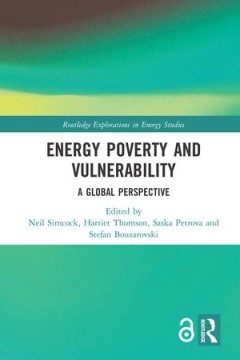
Energy Poverty and Vulnerability A Global Perspective
Energy Poverty and Vulnerability provides novel and critical perspectives on the drivers and consequences of energy-related injustices in the home. Drawing together original research conducted by leading experts, the book offers fresh and innovative insights into the ways in which hitherto unexplored factors such as cultural norms, environmental conditions and household needs combine to shape v…
- Edition
- -
- ISBN/ISSN
- 1351865293, 9781351865296
- Collation
- -
- Series Title
- -
- Call Number
- -
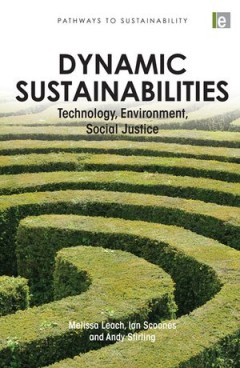
Dynamic Sustainabilities Technology, Environment, Social Justice
Linking environmental sustainability with poverty reduction and social justice, and making science and technology work for the poor, have become central practical, political and moral challenges of our times. These must be met in a world of rapid, interconnected change in environments, societies and economies, and globalised, fragmented governance arrangements. Yet despite growing international…
- Edition
- -
- ISBN/ISSN
- 1136541667, 9781136541667
- Collation
- -
- Series Title
- -
- Call Number
- -
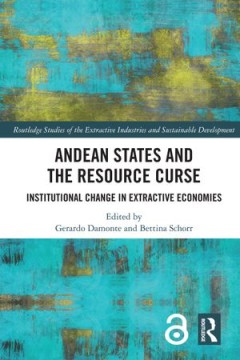
Andean States and the Resource Curse Institutional Change in Extractive Econ…
This volume explores institutional change and performance in the resource-rich Andean countries during the last resource boom and in the early post-boom years. The latest global commodity boom has profoundly marked the face of the resource-rich Andean region, significantly contributing to economic growth and notable reductions of poverty and income inequality. The boom also constituted a period…
- Edition
- -
- ISBN/ISSN
- 9781000527025, 1000527026
- Collation
- -
- Series Title
- -
- Call Number
- -
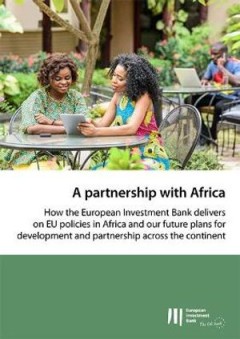
A Partnership with Africa
Africa is embarking upon a period in which its political, economic and social outlook will transform. The European Investment Bank is a key part of the EU toolbox that for decades has helped make the partnership between Africa and Europe stronger. We aim to maximise our potential as the EU bank, so that we can join our African partners in addressing today’s critical challenges together and em…
- Edition
- -
- ISBN/ISSN
- 9789286150135
- Collation
- -
- Series Title
- -
- Call Number
- 650

On Water
When taking a drink is as easy as turning a tap, it is easy to forget that our water supply is fragile and that hundreds of millions of people do not have clean drinking water or proper sanitation.The human impact on our land, the oceans and the climate is endangering our future. In a world accustomed to instant gratification and immediate consumption, we need more than ever long-term thinking …
- Edition
- -
- ISBN/ISSN
- 9789286143199
- Collation
- -
- Series Title
- -
- Call Number
- 650

On Inequality (Big Ideas)
Does Europe have an inequality problem? Amid the COVID-19 pandemic, many Europeans are certainly struggling. The rise of populist movements is another signal that something is awry. Many Europeans no longer see their economy as fair. But is this a problem of too much inequality, or just a problem of ideology? Is inequality even a bad thing? We need to consider the statistics on economic inequal…
- Edition
- -
- ISBN/ISSN
- 9789286149351
- Collation
- -
- Series Title
- -
- Call Number
- 650
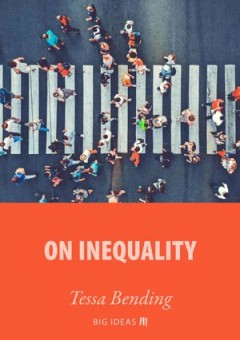
On Inequality (Big Ideas)
Does Europe have an inequality problem? Amid the COVID-19 pandemic, many Europeans are certainly struggling. The rise of populist movements is another signal that something is awry. Many Europeans no longer see their economy as fair. But is this a problem of too much inequality, or just a problem of ideology? Is inequality even a bad thing? We need to consider the statistics on economic inequal…
- Edition
- -
- ISBN/ISSN
- -
- Collation
- -
- Series Title
- -
- Call Number
- 650

Measuring impacts – The experience of the EIB-GDN programme
Measuring, understanding and communicating the EIB’s development impact is a key strategic priority for the European Investment Bank (EIB). In partnership with the Global Development Network the EIB started the Programme in Applied Development Finance in 2017, to deepen understanding of results and impact of operations under the Impact Financing Envelope (IFE) for Africa Caribbean and the Pac…
- Edition
- -
- ISBN/ISSN
- -
- Collation
- -
- Series Title
- -
- Call Number
- 650
 Computer Science, Information & General Works
Computer Science, Information & General Works  Philosophy & Psychology
Philosophy & Psychology  Religion
Religion  Social Sciences
Social Sciences  Language
Language  Pure Science
Pure Science  Applied Sciences
Applied Sciences  Art & Recreation
Art & Recreation  Literature
Literature  History & Geography
History & Geography